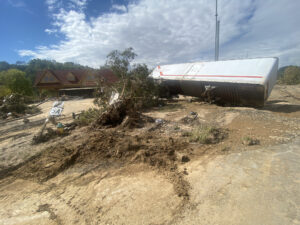The recent events of Hurricane Helene and the subsequent longshoreman strike have created a perfect storm of challenges for the shipping industry.
These disruptions will significantly impact both customers and carriers, leading to delays, increased costs, and logistical headaches. In this article, we’ll delve into the specifics of how Hurricane Helene and Longshoreman strike challenge shipping and explore how freight brokers can respond to mitigate these challenges.
Impacts on Shipping
Supply Chain Disruptions: Hurricane Helene has caused widespread supply chain disruptions. Key transportation routes, including ports, railways, and highways, have been closed or severely restricted. This has led to delays in shipments and bottlenecks, resulting in inventory shortages and increased lead times for customers.
Carrier Operations: Carriers are facing significant operational challenges. The storm impacted major highway and supply systems. This has forced carriers to reroute shipments, often leading to longer transit times, higher fuel costs, and pickup and delivery schedules.
Infrastructure Damage: The hurricane has caused extensive damage to infrastructure, including roads, bridges, and warehouses including the heavily traveled I-40 and I-85. This not only affects the immediate transportation of goods but also has long-term implications for logistics operations in the region.
Increased Costs: Both customers and carriers are experiencing increased costs due to the disruptions. Carriers are incurring higher fuel costs and additional expenses for rerouting and delays, while customers may face higher prices for goods and services due to supply chain constraints.
Longshoreman Strike: The situation has been further complicated by the onset of a longshoreman strike at major ports. This strike has effectively shut down about 36 ports on the East and Gulf coasts, which handle approximately half of the goods shipped into and out of the country. The strike is exacerbating delays and congestion, leading to even longer lead times and increased costs for both customers and carriers.
How Freight Brokers Should Respond
Proactive Communication: This is the most important element of a Broker/Customer/Carrier relationship. Freight brokers should maintain open lines of communication with both customers and carriers. Proactively providing warnings, timely shipment status updates, and warning of potential delays. The conversations are all about helping manage expectations and reduce uncertainty.
Flexible Routing Solutions: It is time to be creative. By leveraging networks, freight brokers can offer alternative routing solutions to bypass affected areas. This may involve coordinating with multiple carriers and utilizing different modes of transportation to ensure timely deliveries.
Risk Management Strategies: Planning and implementing risk management strategies is crucial. Develop contingency plans with Customers, such as pre-positioning inventory in strategic locations or securing additional warehousing space to buffer against disruptions. Time is key. If loads are not hot, don’t rush. Take the time to look at all options.
Collaborate with Carriers: The constraints on the market these events are creating are impacting Carriers as well. Communicate about shipments and destinations in advance. Form a relationship by making an effort to keep their trailers full.
Leveraging Technology: Utilizing advanced logistics technology, such as real-time tracking and predictive analytics, can help freight brokers anticipate disruptions and make informed decisions. Follow local emergency management and governing organizations to stay the most current on closures and infrastructure limitations. This technology can also enhance communication and coordination among all parties involved.
The combined impacts of Hurricane Helene and the longshoreman strike have underscored the vulnerability of logistics operations to natural disasters and labor disputes. However, with proactive measures and strategic planning, freight brokers can play a pivotal role in mitigating the impacts on both customers and carriers. How freight brokers can respond will make a huge difference in carrier/client relationships. By maintaining clear communication, offering flexible solutions, and collaborating with Carriers, freight brokers can help ensure the resilience and continuity of supply chains during such challenging times.
Are you running into challenges due to Hurricane Helene or the Longshoreman strike, call us 440-441-7310.

